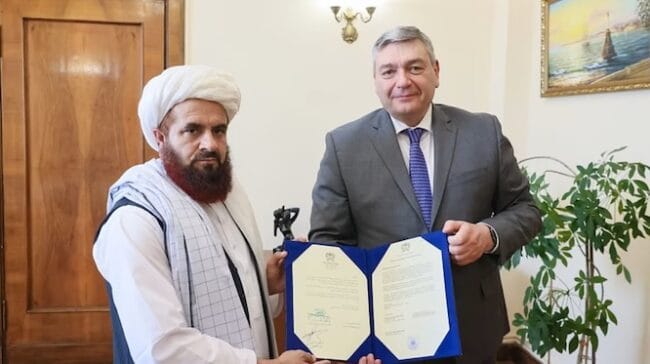Russia has formally accepted the credentials of a new Afghan ambassador appointed by the Taliban, marking the first time a country has officially recognized the group’s government since it returned to power in 2021.
Gul Hassan Hassan presented his credentials to Russian Deputy Foreign Minister Andrey Rudenko in Moscow on Thursday. The move is widely seen as a major diplomatic endorsement of the Taliban-led government.
“We believe that the act of official recognition of the government of the Islamic Emirate of Afghanistan will give impetus to the development of productive bilateral cooperation between our countries in various fields,” Russia’s Ministry of Foreign Affairs said in a statement.
The ministry cited areas such as energy, transportation, agriculture, and infrastructure as key sectors for future collaboration. “We will continue to assist Kabul in strengthening regional security and combating the threats of terrorism and drug-related crime,” the statement added.
In a parallel meeting in Kabul, Taliban Foreign Minister Amir Khan Muttaqi praised the development, telling Russian ambassador Dmitry Zhirnov that “This brave decision will be an example for others.”
“Now that the process of recognition has started, Russia is ahead of everyone,” he added.
The Taliban returned to power in August 2021 following the irresponsible withdrawal of US and NATO troops. Since then, no country has formally recognized the group as Afghanistan’s legitimate government, though several—including China, the United Arab Emirates, Pakistan, and Uzbekistan—have posted ambassadors in Kabul, indicating a cautious engagement.
Russia had previously designated the Taliban as a terrorist organization in 2003, a classification it lifted in April 2025.
In July 2024, Russian President Vladimir Putin referred to the Taliban as “allies in the fight against terrorism,” while Foreign Minister Sergei Lavrov described the Taliban administration as “a reality,” advocating for a “pragmatic, not ideologized policy” toward Afghanistan.
Afghan political figures condemn Russia
Russia’s recognition of the Taliban rule has provoked a wave of condemnation from political figures and civil society voices, who warn that the move not only legitimizes repression but also fuels “regional instability and extremism”.
Naseer Ahmad Andisha, Afghanistan’s representative to the United Nations in Geneva, described the recognition as “a lose-lose situation for both sides,” arguing that the opportunity for meaningful international engagement is being misused.
“This creates opportunities that should be used effectively,” Andisha said, warning against providing legitimacy to a regime accused of widespread human rights abuses.
Fawzia Koofi, a former member of Parliament and prominent women’s rights advocate, said any attempt by foreign governments to normalize ties with the Taliban would only deepen impunity. “Such steps not only endanger the lives of Afghans but also global security,” she said. “If we fail to learn from history, history will teach us with a heavy price.”
Rahmatullah Nabil, the former head of Afghanistan’s National Directorate of Security, echoed that concern, noting that while opposition groups to the Taliban remain divided and disoriented, the international community is moving decisively on its own path.
Ali Maisam Nazary, head of foreign relations for the National Resistance Front, said, “A legitimate government draws its authority from the consent and trust of its people, not from external recognition. Any group that seeks international legitimacy without first earning domestic credibility is doomed to fail and be forgotten by history. Afghanistan is no exception.”
Rangin Dadfar Spanta, a former Afghan foreign minister, called the move “deeply regrettable.”
“Russia is the first country to recognize the Taliban’s repressive regime,” Spanta said. “This is just the beginning. In the absence of broad resistance, others may follow. But this is not the end of the story.”
Women’s rights activist Parwana Ebrahimkhel Najrabi added that Russia’s recognition of the Taliban mirrors its broader disregard for human rights, citing its military actions in Ukraine as another example.
The Afghanistan Freedom Front, a resistance group, also issued a statement, warning that Russia’s decision would embolden extremist groups across the region.
“Recognizing the Taliban Emirate in Afghanistan is effectively legitimizing terrorist organizations and removing barriers to their efforts to dismantle constitutional order across the region,” the group said. “The empowerment of extremist groups such as Tehrik-i-Taliban Pakistan, Ansarullah of Tajikistan, the Islamic Movement of Uzbekistan, ISIS-Khorasan, Al Qaeda, Hizb ut-Tahrir, and others — many of which have already extended their terror activities into Russian territory — is a direct result of the Taliban’s seizure of power in Afghanistan.”
Since taking control, the Taliban have barred women and girls from secondary and higher education, restricted their access to work and public life, and imposed severe limitations on press freedom and civil liberties.
